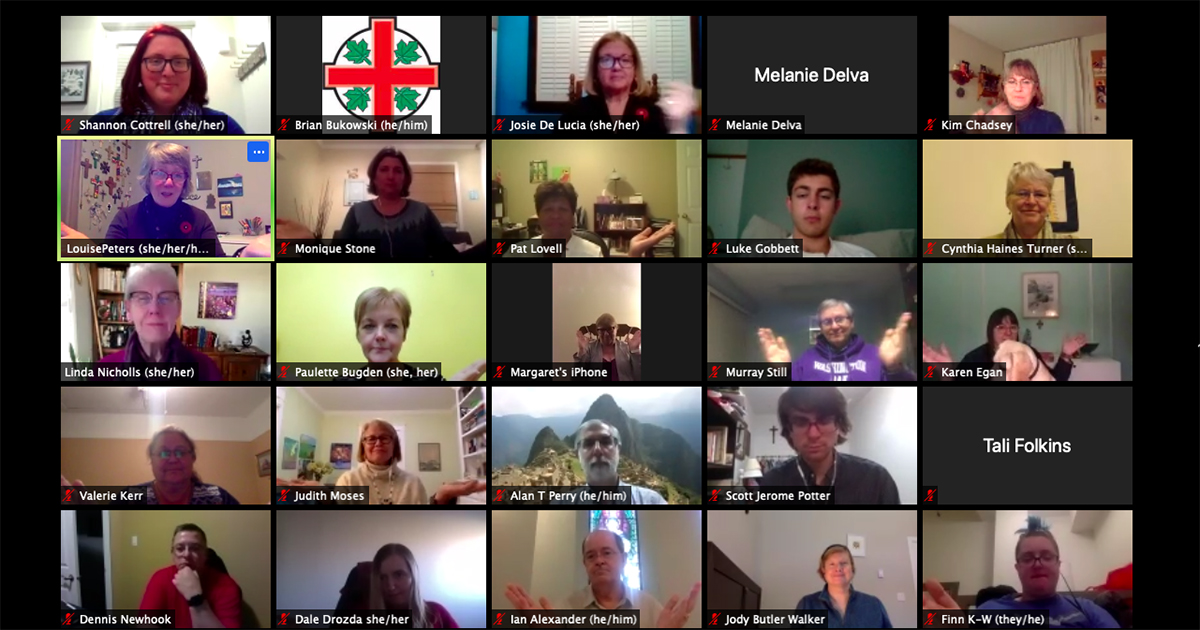View a PDF version of Highlights from the Council of General Synod: November 8, 2020.
Members of the Council of General Synod (CoGS) gathered together online at 3:30 p.m. EST via Zoom conference.
Opening Prayer
The Rev. Louise Peters, chaplain to CoGS, led opening prayer, during which she quoted the late rabbi Jonathan Sacks.
Orders of the Day
The Rev. Monique Stone, co-chair of the Planning and Agenda Team, read out the orders of the day.
Archbishop Linda Nicholls, primate of the Anglican Church of Canada, brought up one piece of unfinished business: adoption of the minutes from the November 2019 meeting of CoGS, which had not been adopted by council in March 2020 because there was not quorum at the start of that meeting. A motion to adopt the minutes was carried.
Strategic Planning Working Group
Co-chairs of the Strategic Planning Working Group (SPWG) Judith Moses and Canon (lay) Ian Alexander, joined by congregational development consultant Janet Marshall, reported the results of the surveys sent out to council members earlier in the meeting
On Friday, Moses said, SPWG members had heard appreciation from CoGS for the work of the listening groups. Churches and dioceses were using innovative methods to rise to the challenge of the COVID-19 pandemic, which presented new challenges—but also an opportunity for new skills, relationships and ways of doing things. The pandemic had taken a toll on morale, mental health, and energy levels. However, the voices of Anglicans were being welcomed in their communities and dioceses, as well as nationally and internationally. Anglicans saw the necessity of building a sustainable foundation for the future beyond the current crisis.
Alexander presented some “incredibly preliminary” findings from the survey to CoGS that included 29 areas of interest emerging from the listening groups. These broadly overlapped with existing priorities of the church, such as building ecumenical relationships, dismantling racism and colonialism, best practices for virtual church, etc.
In prioritizing the areas they saw as most important to strategic development work, CoGS members identified their top five areas of interest as:
- Communication with and among Canadian Anglicans;
2. Dismantling racism and colonialism;
2. Self-determining Indigenous church;
3. National church’s convening, connecting role; and
3. Youth ministry.
(Note: The repetition of numbers in lists indicates that these areas of interest were tied in terms of their response from council in the survey.)
The five areas of least interest for CoGS members included:
- Real estate management—best practices;
2. Structural change and reconfiguration (provinces, dioceses);
3. Partnerships with secular organizations;
4. Liturgical resources; and
4. Management structure, processes and accountability—alternative models.
Finally, the five areas CoGS thought it was most important for the SPWG to consider in-depth were:
- Self-determining Indigenous church;
2. Dismantling racism and colonialism;
3. Public advocacy for social, economic and environmental causes;
4. Governance and decision-making (General Synod, CoGS); and
4. Communication with and among Canadian Anglicans.
Some council members identified areas they thought were missing, such as increasing opportunities for Anglican Church of Canada staff to work collaboratively (breaking down “silos”); clarifying the relationship between and responsibilities of the national church and dioceses; providing internet access and assistance to Indigenous lay readers; and making the church financially strong as well as sustainable.
Other comments and concerns included affirmation for the work of the SPWG; the need to focus on the Great Commission and Five Marks of Mission; developing sustainable and replicable models of mission; more lay reader training, especially in the North; and considering the governance of the national church.
Council members split into breakout groups for 20 minutes of discussion on the following questions:
- What advice, observations or reflections do you have to guide the SPWG in the next phase of its work?
- What are the most important things that the church as a national body can do?
- Are there things that are clearly out of scope or of lesser importance for the church, as a national body, to do or be part of?
The council then reconvened in plenary. Moses noted that the SPWG was still learning, and that it saw hopefulness in spite of fatigue among Anglicans and a desire to overcome obstacles. The next steps for the SPWG after CoGS would be continuing its work on international models and its research on diocesan strategic plans; conducting a joint listening session with Church House management; including more Anglicans in listening conversations, especially on topics identified at this CoGS meeting; and beginning to align the key areas of interest for CoGS with resource parameters.
Council members took a break from 4:25 p.m. to 4:40 p.m.
A Faithful God
After the break, CoGS watched the last video from the Anglican Foundation, We Say Imagine More.
Concluding their three-day exploration of the triennial theme, “A Changing Church, A Searching World, A Faithful God”, council members split into breakout groups for 45 minutes to discuss and reflect upon the third part of the theme, “A Faithful God”.
Primate’s Closing Remarks
Heading into the winter, the shorter days and colder weather can be isolating, the primate noted. She asked council members to keep in touch with others and be gentle with themselves, and thanked them for a good meeting.
Closing Prayer
Led by Peters, the closing prayers included physical gestures as council members held their hands together and then opened their arms.
The primate said the next meeting of CoGS was scheduled for May 2021, but that business of the council may require at least one shorter meeting before then. She wished council members a merry Christmas.
Council adjourned at 5:45 p.m.
Interested in keeping up-to-date on news, opinion, events and resources from the Anglican Church of Canada? Sign up for our email alerts .

